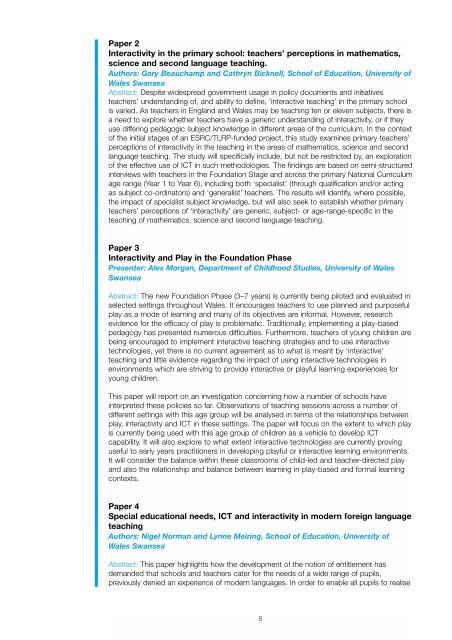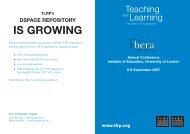Bera Booklet 2005 - Teaching and Learning Research Programme
Bera Booklet 2005 - Teaching and Learning Research Programme
Bera Booklet 2005 - Teaching and Learning Research Programme
- No tags were found...
Create successful ePaper yourself
Turn your PDF publications into a flip-book with our unique Google optimized e-Paper software.
Paper 2Interactivity in the primary school: teachers’ perceptions in mathematics,science <strong>and</strong> second language teaching.Authors: Gary Beauchamp <strong>and</strong> Cathryn Bicknell, School of Education, University ofWales SwanseaAbstract: Despite widespread government usage in policy documents <strong>and</strong> initiativesteachers’ underst<strong>and</strong>ing of, <strong>and</strong> ability to define, ‘interactive teaching’ in the primary schoolis varied. As teachers in Engl<strong>and</strong> <strong>and</strong> Wales may be teaching ten or eleven subjects, there isa need to explore whether teachers have a generic underst<strong>and</strong>ing of interactivity, or if theyuse differing pedagogic subject knowledge in different areas of the curriculum. In the contextof the initial stages of an ESRC/TLRP-funded project, this study examines primary teachers’perceptions of interactivity in the teaching in the areas of mathematics, science <strong>and</strong> secondlanguage teaching. The study will specifically include, but not be restricted by, an explorationof the effective use of ICT in such methodologies. The findings are based on semi-structuredinterviews with teachers in the Foundation Stage <strong>and</strong> across the primary National Curriculumage range (Year 1 to Year 6), including both ‘specialist’ (through qualification <strong>and</strong>/or actingas subject co-ordinators) <strong>and</strong> ‘generalist’ teachers. The results will identify, where possible,the impact of specialist subject knowledge, but will also seek to establish whether primaryteachers’ perceptions of ‘interactivity’ are generic, subject- or age-range-specific in theteaching of mathematics, science <strong>and</strong> second language teaching.Paper 3Interactivity <strong>and</strong> Play in the Foundation PhasePresenter: Alex Morgan, Department of Childhood Studies, University of WalesSwanseaAbstract: The new Foundation Phase (3–7 years) is currently being piloted <strong>and</strong> evaluated inselected settings throughout Wales. It encourages teachers to use planned <strong>and</strong> purposefulplay as a mode of learning <strong>and</strong> many of its objectives are informal. However, researchevidence for the efficacy of play is problematic. Traditionally, implementing a play-basedpedagogy has presented numerous difficulties. Furthermore, teachers of young children arebeing encouraged to implement interactive teaching strategies <strong>and</strong> to use interactivetechnologies, yet there is no current agreement as to what is meant by ‘interactive’teaching <strong>and</strong> little evidence regarding the impact of using interactive technologies inenvironments which are striving to provide interactive or playful learning experiences foryoung children.This paper will report on an investigation concerning how a number of schools haveinterpreted these policies so far. Observations of teaching sessions across a number ofdifferent settings with this age group will be analysed in terms of the relationships betweenplay, interactivity <strong>and</strong> ICT in these settings. The paper will focus on the extent to which playis currently being used with this age group of children as a vehicle to develop ICTcapability. It will also explore to what extent interactive technologies are currently provinguseful to early years practitioners in developing playful or interactive learning environments.It will consider the balance within these classrooms of child-led <strong>and</strong> teacher-directed play<strong>and</strong> also the relationship <strong>and</strong> balance between learning in play-based <strong>and</strong> formal learningcontexts.Paper 4Special educational needs, ICT <strong>and</strong> interactivity in modern foreign languageteachingAuthors: Nigel Norman <strong>and</strong> Lynne Meiring, School of Education, University ofWales SwanseaAbstract: This paper highlights how the development of the notion of entitlement hasdem<strong>and</strong>ed that schools <strong>and</strong> teachers cater for the needs of a wide range of pupils,previously denied an experience of modern languages. In order to enable all pupils to realise5
















